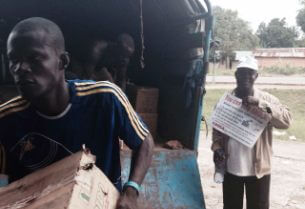In a conference call convened by the Anglican Alliance on 29 August 2014, church leaders in West Africa spoke with Anglican agencies to share the latest information on the Ebola outbreak and help coordinate the international response to the crisis.
The Church in Liberia is supplying food parcels for households in quarantined communities and providing basic protective equipment for health workers at local hospitals. However hospitals and healthcare centres remain under-resourced. Some communities are in quarantine and lack an ‘Ebola Centre’, which would be equipped with the protective gear needed to treat patients.
Most Revd Jonathan Hart, Archbishop of Liberia, said:
“Without protective equipment, health workers are unable to attend to any patients with Ebola-type symptoms. Even if the patient does not have Ebola but is suffering from, say, malaria, they will be unable to access healthcare due to the risk of Ebola contamination. “
Episcopal Relief & Development, PWRDF and Us (formerly USPG) are working through their church partners to provide this essential equipment and aid the treatment of Ebola as well as other serious diseases. By providing protective gear to healthcare centres and hospitals, medical staff can treat patients without fear of Ebola contamination. You can give to these appeals by following the links below.
Mis-information and a lack of medical supplies have hampered an efficient response to the Ebola outbreak. Some communities have refused help as they believed there was no hope of recovery and were afraid to go to health centres. Local churches are working hard to share accurate information, and are reaching local church congregations and communities with messaging on how to avoid Ebola and prevent its spread.
A typical poster has the words: “You can stop Ebola! Always wash your hands with soap. Do not hide sick people. Do not touch dead bodies. Do not eat bush meat. When you are sick with fever, headache, body pain, etc. go to the hospital quick, quick, quick. Listen to health workers – they know how best to help you. EBOLA can catch big people and small children”.
Volunteers are promoting accurate information about Ebola and distributing hygiene and sanitation supplies: radio messages are played across Liberia in nine different dialects, and posters and flyers are distributed to all churches and taken into the community to reach local people with accurate information.
Abiy Seifu, Senior Program Officer with Episcopal Relief & Development, said:
“Church leaders in Sierra Leone and Liberia are playing an important role in the ebola response effort as they are highly respected and listened to especially during times of crises. Misconceptions on the causes of ebola, prevention and proper response methods are widespread especially in quarantined communities. Church leaders, given their relationship with their congregation, are able to build on the trust and confidence they have within their respective communities to influence positive change and reduce behavior and practices that put people at risk.”
In Sierra Leone, the Anglican Diocese of Bo is actively participating in the government District Health and Development Team’s planning and implementation process for Ebola control, specifically on detection and case management. Local health volunteers, who had already been active in the Church’s malaria and HIV prevention efforts have been trained to assist with education, case identification and contact tracing. The volunteers have also distributed hand-washing stations.
When asked how the Anglican Communion could best support those in West Africa, Archbishop Jonathan said, “We appreciate your continued prayers for all of our people in this region: pray for our health workers, pray for our church members and those in areas where there is need, pray for God’s love to cover our nation as we individually and collectively fight the Ebola disease. People can also help through the agencies coming to us to help us stop the spread of Ebola. This will enable us to reach out to communities, assure them of prayers and commitment to help them stop Ebola and support them in time of crisis.”
Longer term issues related to family disintegration, livelihood loss, market loss and other social and economic consequences of the outbreak are also being addressed in the churches’ plans for long-term support. Restrictions on transportation and commerce due to quarantine are already causing food shortages, and a lack of market access and missed planting seasons are expected to result in widespread food insecurity.
Episcopal Relief & Development, PWRDF and Us are working with the Church to address both these long term issues and the immediate needs. A full proposal from the local church on their response to the crisis will be available on our website in the coming weeks.
Please give generously to the below appeals and continue faithfully in prayer.
Episcopal Relief & Development – USA
PWRDF – Canada
Us (formerly USPG) – UK
Anglican Board of Mission – Australia have also linked here to appeals and prayers for West Africa.
More prayer resources are available from:
In the picture: Local volunteers unloading supplies in Bong County, Liberia. One person holds up the poster that is distributed to be posted in households and community centres.
Photo credit: Episcopal Relief & Development

